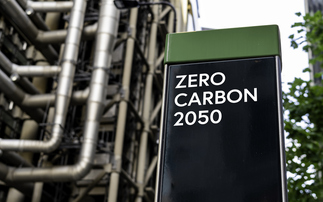In an exclusive extract from BusinessGreen's new Towards Net Zero Report, we reflect on a dramatic 12 months for the green economy
The past year has been the most exciting and eventful in the history of the green economy. In a way, the expansion of green businesses and the ever-higher stakes that they are striving to tackle means this is always true: as emissions keep climbing and clean tech records keep tumbling, each year is more important than the last. But the past 12 months feel different to what has gone before, at both a national and global level.
When BusinessGreen rebranded and launched its Net Zero Now campaign just over a year ago Greta Thunberg and Alexandria Ocasio-Cortez were virtual unknowns, talk of climate emergencies and Green New Deals and net zero emission targets was confined to environmental NGO brainstorming sessions, and the idea the UK could run for a fortnight without coal power or that green protestors could secure broad public support by shutting down the streets of London would have been greeted with a shrugged 'maybe one day, but not yet'. Blue Planet II's focus on the impact of plastic pollution and the rapid response from business and political leaders had suggested public opinion was stirring, just as the emergence of post-Paris Agreement corporate climate strategies and campaigns had underscored how climate action was banging on the doors of the mainstream. But for many businesses, investors, and politicians environmental issues remained a marginal concern - hugely important, but rarely a priority.
Everything changed
Twelve months later and the backdrop against which the green economy operates has transformed, perhaps inexorably.
The UK has become the first major economy to confirm it will set a net zero emission target, joining a growing band of countries and states - including Sweden, Finland, New Zealand, California, and many others - in publicly committing to full and rapid decarbonisation. The UK may be the first large economy to make such a pledge, but it will not be the last. France, Germany, and Japan are all at various stages of considering similar goals. The EU looks as if it too will adopt a net zero target for 2050, despite concerns among a handful of states. Virtually all the Democrat candidates to take on Donald Trump in next year's US presidential race have pledged to set a net zero target and back it with hugely ambitious decarbonisation policies. The pressure on the likes of China and India to turbocharge their position as two of the world's largest clean tech markets and begin to curb their emissions is intensifying.
Crucially, public support for more ambitious climate action has soared. In the UK, YouGov surveys show environmental concerns at their highest level since polling began in 2010, with the environment cited as the third-biggest issue facing the UK after health and Brexit. Levels of concern are even higher among those younger people who have grown up surrounded by warnings of escalating environmental crisis.
In recent month the public has given politicians and business leaders permission to act. Parliament followed a host of local authorities in voting to declare a ‘climate emergency', the government fast-tracked approval of a net zero target; from vegan sausage rolls to industrial carbon capture pilot projects, businesses rushed to bring forward new green products and technologies.
Meanwhile, investors ratcheted up demands for top corporates to come forward with credible climate risk strategies. Growing numbers of listed firms, including some of the world's most carbon-intensive companies, responded with science-based emissions targets, 100 per cent renewable energy commitments, and increased investment in the innovative clean technologies that will be essential for deep decarbonisation.
Multiple triggers
The debate over what triggered the shift in public, political, and business engagement with the climate threat will likely rage on for years. In truth, the convergence of multiple trends combined with some exceptional individuals and fortuitous circumstances to shape the green zeitgeist.
The foundations were laid over the past 20 years as green businesses and innovators provided the evidence base that clean technologies could outcompete polluting incumbents on both price and performance. A crucial highlight came in 2017, in the form of successful bids for new offshore wind contracts that far surpassed expectations and pointed towards a future where offshore turbines could undercut fossil fuel power. However, similar breakthroughs have been repeated across the green economy as electric vehicle ranges have improved, smart grid technologies have scaled, and energy-efficiency improvements have continued.
Consequently, governments have been able to point to how the UK has delivered the fastest emissions cut of any major economy, even as its economy has continued to grow. At the same time, businesses and investors have been able to gather ever-more compelling evidence that effective decarbonisation strategies can help cut costs, curb risks, and enhance overall competitiveness. The link between strong environmental performance and impressive financial performance has become ever clearer.
Meanwhile, a new generation of environmental campaigners have followed the scientific warnings - themselves presented ever more effectively by the IPCC and others - through to their logical conclusion and shrugged off the temptation to temper their calls for action to avoid accusations of fearmongering. The undeniable logic of Greta Thunberg's challenge to the global political and corporate elite has stung: if you regard climate change as a crisis, why don't you act like it? That simple question, and the school strikes and wider protests that it triggered, has resonated. It has made peaceful civil disobedience understandable in the eyes of many, even
if plenty of people maintain there are more appropriate ways to get the message across. It has prompted a growing band of business leaders to take more risks in pursuit of deep decarbonisation. It has allowed politicians to consider policies that may result in short-term costs and disruption, as they start to prioritise climate action.
Finally, do not underestimate the role of climate impacts themselves in shifting public opinion. Last summer's unprecedented northern hemisphere heatwave hammered home to many people the stark lived experience of a climate changing faster and more dramatically than most expected. Those who have spent decades arguing against a more ambitious response to the climate threat have been mugged by reality. As temperatures and emissions have edged ever upwards our collective understanding of what climate breakdown means and the implications it has for food security, migration, health, and the resilience of our communities has inevitably improved. The scale of the challenge has become harder and harder to ignore.
Harsh realities
Unfortunately, increased climate awareness and engagement represents just one tiny step forward in an epic and historic journey. The harsh truth is that global greenhouse gas emissions continued to climb last year, pushing atmospheric concentrations of greenhouse gases to their highest levels in human history and possibly their highest level in three million years. Tipping points in the climate system that could unleash runaway warming remain a very real threat. Climate models suggest the world remains on track to smash through the 2C warming target agreed under the Paris Agreement and spiral towards 3C or even 4C of warming within the lifetime of people born today.
Meanwhile, investment in clean energy, both globally and domestically, has slowed - dramatically in the case of the UK where the rolling back of key renewables policies has had a chilling effect on investment. Plummeting clean tech costs mean renewables, electric vehicles, and smart grids are still set to reshape the worlds of energy, buildings, and transport, but investment levels are still well below the level most experts agree are required to move economies onto a Paris Agreement-compatible trajectory.
The Committee on Climate Change (CCC) may have concluded it is both technically and economically feasible to build a net zero emission economy within 30 years - a view now endorsed by the government. But even if the costs of the transition do prove to be as low as the estimated one per cent of the UK's GDP in 2050, the technical and political challenge involved in fully decarbonising the energy and road transport systems, installing green heat technologies in pretty much every building in the country, and embracing low-carbon agricultural techniques, is daunting in the extreme. And that is before you consider the need to decarbonise heavy industry, aviation, and shipping, while also rolling out credible and scalable negative emissions projects.
Much of the business community is up for the challenge. The corporate response to the government's adoption of a net zero target was almost universally positive, with businesses of all sizes recognising that more ambitious climate action is now non-negotiable. Indeed, many of the world's largest and most successful businesses have accepted that such a dramatic and rapid industrial revolution will result in huge commercial opportunities as new technologies and business models emerge.
As several leading economists were quick to point out, once you include the co-benefits that arrive from decarbonisation, such as improved air quality, healthier cities, and enhanced energy security, the economic impact of the net zero transition will almost certainly be net positive. The Telegraph's Ambrose Evans-Pritchard put it best when he described the net zero goal as "an economic gift from Mars".
Never ones to turn down a gift, many of the world's largest companies are responding with ambitious emissions reduction strategies of their own. Most notably, the energy and auto giants that had previously hedged their clean tech investment strategies are increasingly taking an ‘all-in' approach, drastically increasing investment in zero-carbon technologies and business models. Even some of the oil majors are following suit, albeit at a slower pace. And while industrial emitters and airlines harbour inevitable concerns about the competitiveness implications that will arise from the net zero transition, the hunt is now on for both credible offset programmes and the breakthrough technologies that could one day decarbonise the most carbon-intensive corners of the economy.
Net Zero Now
This is the backdrop for BusinessGreen's Towards Net Zero report and the next phase of our Net Zero Now campaign. As attention inevitably shifts from whether to adopt a net zero goal to how to deliver on such a target, this report takes a look at how the four main pillars of the green economy - buildings, transport, energy, land use and supply chains, and waste and resources - are currently positioned for the net zero transition.
It explores the policy, technology, and market trends that have shaped the green economy over the past decade and examines how leading businesses are preparing for a decade of significant disruption as the net zero transition accelerates. The aim is to provide leading executives with an invaluable and accessible guide to the current state of play across the green economy and the risks and opportunities that are likely to present themselves in the coming years as net zero policies and strategies evolve.
The central conclusion across every corner of the British economy is clear: if the past year has been the most exciting and eventful in the green economy's history, the coming years promise to be even more dramatic as the full scale of the climate threat and the net zero opportunity become obvious. Savvy businesses are already responding to this historic tipping point and everything it implies and plenty more organisations are now poised to follow them. In short, you ain't seen nothing yet.
The BusinessGreen Towards Net Zero Report is available to download to all subscribers.










